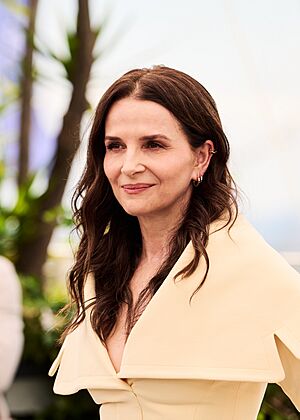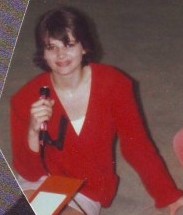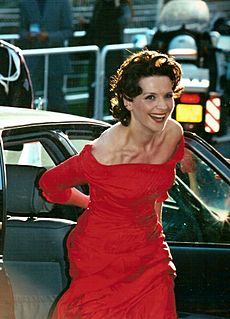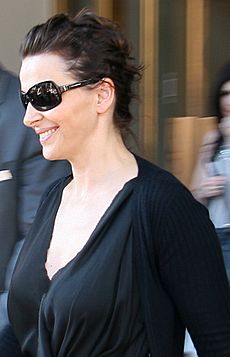Juliette Binoche facts for kids
Juliette Binoche (born March 9, 1964) is a famous French actress. She has starred in over 60 movies in both French and English. For her amazing acting, she has won many important awards. These include an Academy Award, a British Academy Film Award, and a César Award, which is France's top film award.
Binoche became a star in France with the 1985 drama Rendez-vous. She won awards for her role in the 1993 film Three Colours: Blue. She gained worldwide fame after winning an Academy Award for Best Supporting Actress for the movie The English Patient (1996). She was also nominated for an Academy Award for Best Actress for the romantic film Chocolat (2000).
In 2010, she won the Best Actress award at the Cannes Film Festival for the movie Certified Copy. This made her the first actress to win the "triple crown" for Best Actress at the Cannes, Venice, and Berlin film festivals. She has also acted on stage in London and on Broadway in New York City.
Contents
Early Life and Family
Juliette Binoche was born in Paris, France. Her parents, Jean-Marie Binoche and Monique Yvette Stalens, were both involved in theater as actors and directors. Her father is French with some Portuguese-Brazilian roots. Her mother was born in Częstochowa, Poland.
Binoche's grandparents on her mother's side were also actors in Poland. During World War II, they were held as prisoners in the Auschwitz camp because they were intellectuals. Her great-uncle, Léon Binoche, was an athlete who won a gold medal in rugby at the 1900 Paris Olympics.
When her parents divorced in 1968, four-year-old Juliette and her sister Marion went to a boarding school. As a teenager, she loved acting and even directed a school play. She briefly studied acting at a top school in Paris but left because she didn't like the classes. Instead, she joined a theater group and toured around Europe.
Acting Career
Becoming a Star
Binoche started her career with small parts in French TV shows and movies. Her big break came in 1985 with the film Rendez-vous. The movie was a huge success at the Cannes Film Festival, and Binoche became a celebrated new star. For this role, she was nominated for her first César Award.
She then starred in the 1986 film Mauvais Sang, which was also a success. This led to another César nomination and helped her become one of France's most promising young actresses.
Her first English-language film was The Unbearable Lightness of Being (1988). It was a worldwide hit and introduced her to international audiences. Even with this success, she chose to return to France to continue making French films.
International Fame in the 1990s
In the 1990s, Binoche starred in several major international films. She acted in Emily Brontë's Wuthering Heights (1992) and Damage (1992), which grew her fame outside of France.
In 1993, she starred in Three Colours: Blue. In the film, she played a woman dealing with the loss of her husband and daughter. Her performance was highly praised, and she won the Best Actress award at the Venice Film Festival and a César Award.
Her biggest international success came with The English Patient (1996). She played Hana, a kind nurse during World War II. For this role, she won the Academy Award for Best Supporting Actress. This made her only the second French actress to ever win an Oscar.
Later in the decade, she starred in the popular romantic movie Chocolat (2000). She played Vianne Rocher, a woman who opens a chocolate shop in a small French village. The film was a worldwide hit, and she was nominated for an Academy Award for Best Actress.
A Varied Career in the 2000s
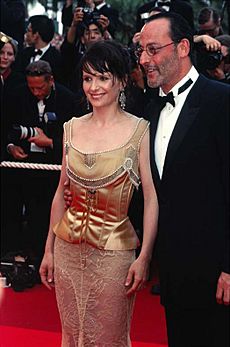
After the success of Chocolat, Binoche was a major international star. She wanted to try different kinds of roles. She starred in the French comedy Jet Lag (2002) with actor Jean Reno.
She also worked with famous director Michael Haneke on the thriller film Caché (2005). The movie was a critical success and won awards at the Cannes Film Festival.
In 2007, she appeared in the American comedy Dan in Real Life with Steve Carell. The next year, she starred in the French film Paris, a movie about the lives of different people in the famous city.
In 2008, she also starred in a modern dance show called in-i, which toured around the world. This showed her talent was not just in film but also on stage.
Continued Success
In 2010, Binoche won the Best Actress award at the Cannes Film Festival for her role in Certified Copy. This was a historic win, making her the first actress to win the top acting prize at the three major European film festivals: Cannes, Venice, and Berlin.
She continued to work on interesting projects. She appeared in the big-budget movie Godzilla (2014) and the critically acclaimed film Clouds of Sils Maria (2014). For Clouds of Sils Maria, she worked with director Olivier Assayas and actresses Kristen Stewart and Chloë Grace Moretz.
In recent years, she has starred in a variety of films. These include the comedy Slack Bay (2016), the science-fiction movie Ghost in the Shell (2017), and the drama The Truth (2019). In 2024, she played Coco Chanel in the TV series The New Look.
In 2024, she was named the President of the European Film Academy. The next year, she served as the jury president for the 2025 Cannes Film Festival.
Personal Life and Other Work
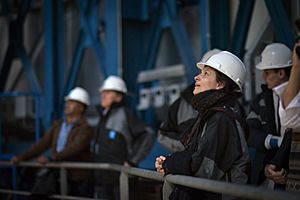
Juliette Binoche has two children. Her son, Raphaël, was born in 1993. Her daughter, Hana, was born in 1999. Her sister, Marion Stalens, is a photographer and documentary filmmaker.
Binoche is also known for her charity work. She supports an organization called Enfants d'Asie, which helps children in Cambodia. She is also involved with Reporters Without Borders, a group that defends freedom of the press around the world.
She has often spoken up about political issues. She has supported causes like education for all children and has protested against the unfair treatment of journalists and others in countries like Iran. At the 2010 Cannes Film Festival, she famously called for the release of Iranian director Jafar Panahi, who had been put in prison.
Selected Filmography
| Year | Title | Role |
|---|---|---|
| 1985 | Rendez-vous | Nina/Anne Larrieux |
| 1988 | The Unbearable Lightness of Being | Tereza |
| 1993 | Three Colors: Blue | Julie Vignon de Courcy |
| 1996 | The English Patient | Hana |
| 2000 | Chocolat | Vianne Rocher |
| 2005 | Caché | Anne Laurent |
| 2007 | Dan in Real Life | Marie |
| 2010 | Certified Copy | Elle |
| 2014 | Godzilla | Sandra Brody |
| 2014 | Clouds of Sils Maria | Maria Enders |
| 2017 | Ghost in the Shell | Dr. Ouelet |
| 2019 | The Truth | Lumir |
| 2023 | The Taste of Things | Eugénie |
Images for kids
See also
 In Spanish: Juliette Binoche para niños
In Spanish: Juliette Binoche para niños
 | Misty Copeland |
 | Raven Wilkinson |
 | Debra Austin |
 | Aesha Ash |


